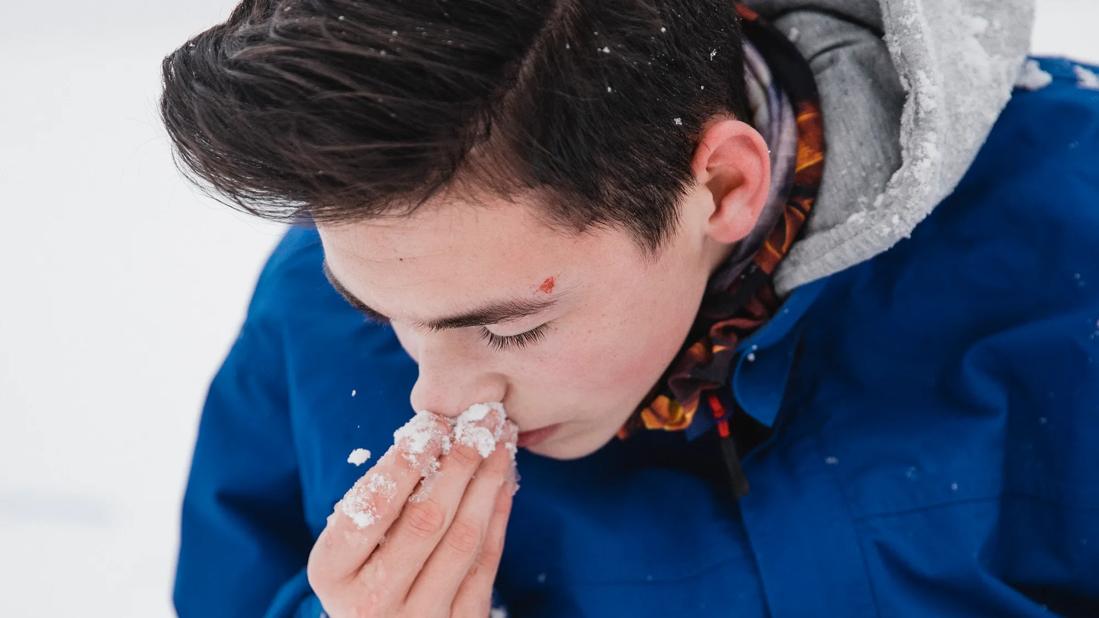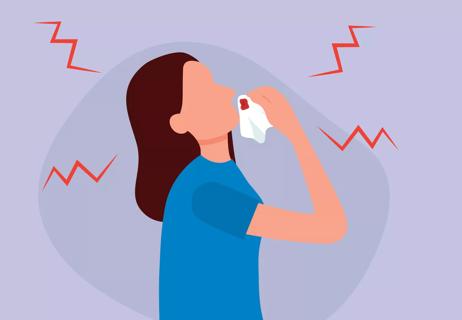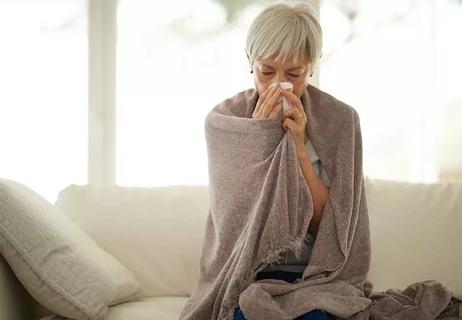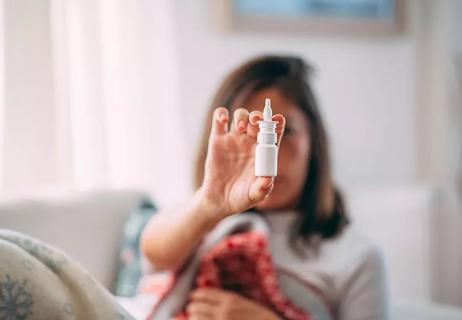Staying calm, sitting up straight and gently pinching the sides of your nostrils can help a bloody nose go away faster

You go to blow your nose. But instead of the usual snot, you see red on your tissue. A nosebleed seems to happen out of the blue and that can make it feel a little startling — for kids and adults alike!
Advertisement
Cleveland Clinic is a non-profit academic medical center. Advertising on our site helps support our mission. We do not endorse non-Cleveland Clinic products or services. Policy
But nosebleeds (also known as epistaxis) are fairly common — many of us have experienced them at least once. It happens when the tissue within the lining of your nose starts to bleed. Usually, it’s because the tiny blood vessels within your nose have become irritated or dry.
Luckily, there are simple steps you can take to help them stop. Ear, nose and throat surgeon (otolaryngologist) Mohamad Chaaban, MD, shares do’s and don’ts for stopping a nosebleed.
Sometimes, a nosebleed feels like it could last forever. Even if it does go away on its own, a nosebleed can be alarming and irritating. Take the following steps to put an end to a nosebleed.
Any kind of bleeding can make anyone skittish. But try and stay calm as best you can. The more you panic, the longer it could take for the bleeding to stop, especially if you’re moving around or rubbing your nose. Stress can also increase your blood pressure, which can cause your blood vessels to dilate more and worsen the bleeding.
That’s why taking a deep breath (again, as best you can) and keeping your mind still are the first steps. The same is true if you’re a parent or caregiver dealing with your child’s nosebleed. If you seem chill, little ones are more likely to follow suit.
Advertisement
At this point, you’ve probably already grabbed about 20 tissues or so. That’s fine and good, but Dr. Chaaban also recommends a straight posture. That’s right, the best thing to stop a nosebleed is to remain vertical. Don’t lay flat or put your head between your legs.
Next, Dr. Chaaban says that you’ll want to lean slightly forward while staying as vertical as possible. Keep your head above your heart while leaning the bottom half of your body forward. This is important because it prevents blood from going down your throat.
You’ll need a couple of extra tissues for this one. Use your thumb and index finger to pinch together the soft part of your nose. Make sure to pinch the soft part of the nose against the middle part of the nose (septum). Squeezing at or above the bony part of your nose won’t put pressure where it can help stop the bleeding.
This pinch method works by directly compressing the blood vessels in the front part of your nasal septum, an area rich with blood vessels and the usual source of nosebleeds.
“It’ll feel like you were pinching your nose shut,” Dr. Chaaban explains.
After 10 to 15 minutes of applying steady pressure, release gently and check if the bleeding has stopped. If it hasn’t, gently pinch again for another 10 minutes. If you’re taking a blood thinner, you may need to pinch your nose for a longer time.
If you’d like, apply an ice pack to the bridge of your nose to further help narrow blood vessels (which will slow the bleeding) and provide comfort. This isn’t a necessary step, but you can try it.
You can also place a rolled tissue or gauze under your upper lip. Apply gentle pressure while also using the pinch method we outlined above. This can sometimes help put pressure on small blood vessels connected to your nose.
And now, we wait.
“Keep the pressure for at least 10 to 15 minutes before checking to see if the bleeding has stopped,” Dr. Chaaban advises. Just set a timer and sit tight, even if you think you feel like the bleeding has stopped.
“Don’t relieve pressure before the time is up to check, as you may restart the bleeding,” he adds.
After the bleeding stops, don’t bend over, strain and/or lift anything heavy. Don’t blow or rub your nose for several days. Dr. Chaaban also says avoiding heavy lifting right after a nosebleed is a good idea. The strain can increase your blood pressure, which can bring on more bleeding.
If your nosebleed is still stubborn, a nasal spray may help stuff it up faster. You can spray an over-the-counter decongestant spray like oxymetazoline (Afrin®, Dristan®, Neo-Synephrine® or Vicks Sinex®) into the bleeding side of your nose and then apply pressure to your nose. This is helpful to have with you if you bleed often particularly in the winter time.
Advertisement
Note: You shouldn’t use these topical decongestant sprays over a long period. Doing so can cause an increase in the chance of a nosebleed. And be careful not to use more than the recommended amount so you don’t further irritate your nostrils.
A bloody nose can sometimes be a red flag your body is waving. In those cases, you’ll need more help than a box of tissues. If the bleeding is coming from more prominent blood vessels in the back of your nose, it may require further management, Dr. Chaaban points out.
You should go to the emergency room for your nosebleed if:
In some cases, you may want to see a healthcare provider even if the nosebleed isn’t a full-on emergency.
Persistent and recurring nosebleeds can be a sign of another health issue, says Dr. Chaaban. If you get frequent nosebleeds, nosebleeds that just won’t stop or if your nosebleeds are accompanied by other symptoms, such as numbness or pressure in your face, make an appointment with an ear, nose and throat doctor to get it checked out.
Advertisement
If you want to avoid bloody noses in the future, try these tips:
Nosebleeds can stop you in your tracks. But by staying calm, being patient, sitting up straight and applying pressure, most bloody noses will come to pass. If you’re experiencing frequent or severe nosebleeds, it’s always a good idea to consult a healthcare provider, as this may indicate an underlying problem.
Advertisement
Learn more about our editorial process.
Advertisement

If your nose is constantly running, it could be allergies, chronic sinusitis, nasal polyps or other concerns

Allergies, indigestion and the effects of gravity can all mess with your nose at night

Dry air, allergies or nose-picking may be to blame for nighttime epistaxis

Take care of your runny or stuffy nose by staying hydrated, using a humidifier and considering a medication

Allergies, acid reflux and even pregnancy can increase drainage and upset your stomach

Seek help if bleeding doesn’t stop or they’re interfering with your life

It’s usually the way your nose manages airflow, but sometimes, it could be other issues

Correct positioning is one of the keys to getting the best results

Wearing a scarf, adjusting your outdoor activities and following your asthma treatment plan can help limit breathing problems

Your diet in the weeks, days and hours ahead of your race can power you to the finish line

When someone guilt trips you, they’re using emotionally manipulative behavior to try to get you to act a certain way